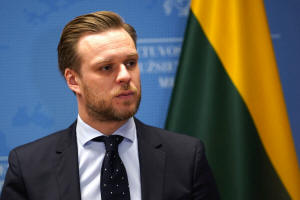EU ministers urge Hungary to sign up to planned Russian oil embargo
 Send a link to a friend
Send a link to a friend
 [May 16, 2022] By
Robin Emmott and Sabine Siebold [May 16, 2022] By
Robin Emmott and Sabine Siebold
BRUSSELS (Reuters) - EU foreign ministers
sought to publicly pressure Hungary on Monday to lift its veto on a
proposed oil embargo on Russia, with Lithuania saying the bloc was being
"held hostage by one member state".
The embargo proposed by the European Commission in early May would be
the harshest sanction yet after Moscow's Feb. 24 invasion of Ukraine and
includes carve-outs for EU states most dependent on Russian oil.
Germany, the European Union's biggest economy and a major buyer of
Russian energy, said it wanted a deal to authorise the oil embargo which
it suggested could last for years.
"I am confident that we will find agreement in the coming days," German
Foreign Minister Annalena Baerbock said as she arrived for a meeting
with her counterparts. "We need to prepare it extremely well because it
needs to be sustainable."
But Hungary, Moscow's closest ally in the EU, has said it wants hundreds
of millions of euros from the bloc to mitigate the cost of ditching
Russian crude. The EU needs all 27 states to agree to the embargo for it
to go ahead.

"The whole union is being held hostage by one member state ... we have
to agree, we cannot be held hostage," Lithuanian Foreign Minister
Gabrielius Landsbergis said.
Few ministers directly called Hungary out by name as they spoke to
reporters, but Romania said it was up to the bloc to bring Budapest
round.
'OIL WILL BE INCLUDED'
Hungarian Foreign Minister Peter Szijjarto said on his Facebook page on
May 11 that there was no solution in sight.
He said the government of Prime Minister Viktor Orban needed "hundreds
of millions of dollars" for Hungarian refineries, a capacity increase
for a Croatian pipeline and compensation for the Hungarian economy.
[to top of second column]
|

Lithuanian Foreign Minister Gabrielius Landsbergis listens during a
news conference in Vilnius, Lithuania March 18, 2022. REUTERS/Janis
Laizans/File Photo

However, EU ministers ranging from Austria to Estonia
said there would still be an oil embargo, even if it took longer to
come to an agreement.
"This package (of sanctions) will be adopted and oil will be
included," Estonia's top diplomat, Eva-Maria Liimets, said - a
position echoed by others, including Luxembourg and Romania. Spain
also supported the Commission's proposal.
An oil embargo, already imposed by the United States and Britain and
which would follow five rounds of earlier EU sanctions, is seen as
the best way to reduce Russian income for its war in Ukraine.
The EU's foreign policy chief, Josep Borrell, last week signalled
that Monday's meeting might have been the moment for a breakthrough.
On Monday he said he was doing his utmost to unblock the situation.
Some diplomats now point to a May 30-31 summit as the moment for
agreement on a phased ban on Russian oil, probably over six months,
with a longer transition period for Hungary, Slovakia and the Czech
Republic.
Moscow calls its invasion of Ukraine a "special military operation"
to rid the country of fascists, an assertion Kyiv and its Western
allies say is a baseless pretext for an unprovoked war.
(Reporting by Robin Emmott and Marine Strauss; Editing by Nick
Macfie and Andrew Heavens)
[© 2022 Thomson Reuters. All rights
reserved.]
This material may not be published,
broadcast, rewritten or redistributed.
Thompson Reuters is solely responsible for this content.
 |